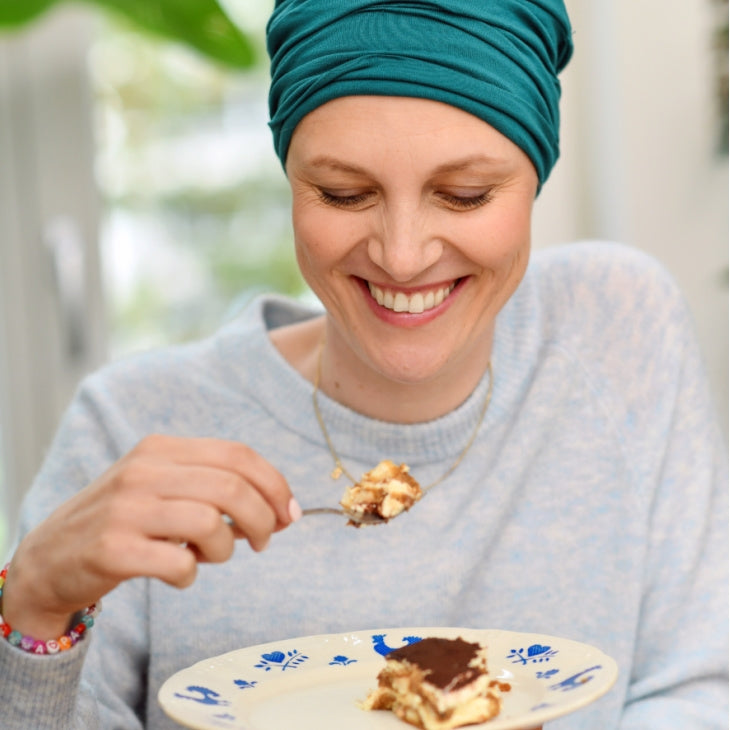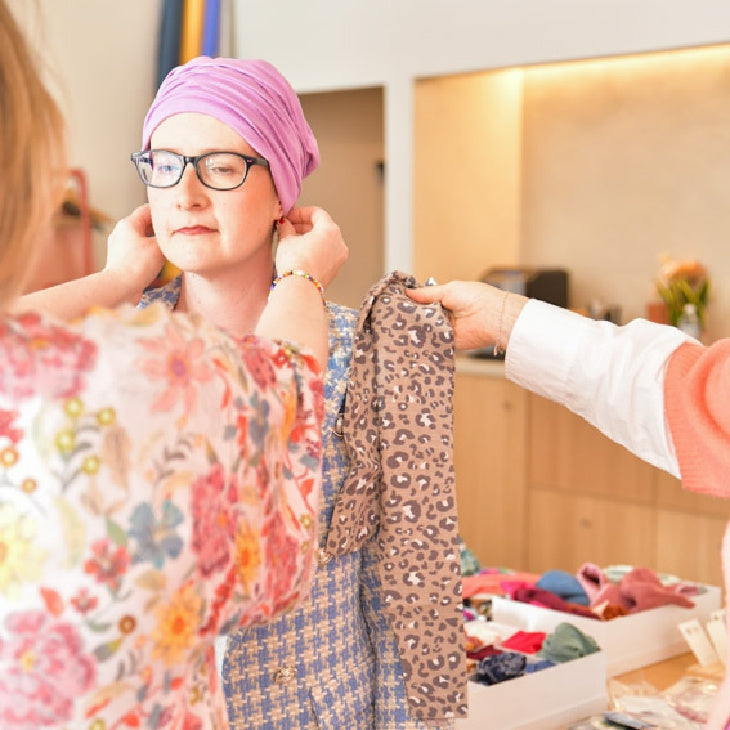Changes in taste and smell caused by chemotherapy or other medications are incredibly common—and incredibly frustrating. Suddenly, nothing tastes like it used to, and your appetite disappears. We spoke with Sophie Hoste, oncology dietitian at UZ Leuven. She shares her advice for some of the most common problems. “But remember,” Sophie says, “there’s always a bit of trial and error involved. Taste and smell are very personal, so there’s no universal solution.”
“Everything I eat tastes disgusting after chemo.”
Sophie Hoste: “Does all your food taste bad? It could be that your mouth is dry. Staying hydrated is a must. Drink plenty of water—unless you’re struggling to maintain your weight, which is very common for many patients. In that case, opt for drinks with calories, like soft drinks, fruit juice, or chocolate milk.
Foods with a fresh, slightly sour taste can also help neutralise bad flavours: a spoonful of yoghurt, a piece of fruit, a mint leaf in your mouth, or a few slices of cucumber in your water.
Many patients also suffer from irritated mucous membranes or mouth ulcers caused by treatment. Always mention this to your doctor—they can prescribe a suitable mouthwash. And don’t underestimate oral hygiene: the cleaner your teeth and mouth, the better your food will taste. Brush thoroughly, and visit your dentist before starting chemo treatment if you can.”

“My food tastes overly sweet, salty, or sour!”
Sophie Hoste: “Chemo and other medications can make flavours much more intense. Suddenly, everything might taste extremely sweet or overly salty, for example. Our tip: lean into it. If you mainly taste salty flavours, eat salty foods. It’s far more pleasant for a slice of salami to taste extra salty than for your dessert to taste like salt! Choose foods that match the dominant flavour you’re experiencing.”
“Pfff… everything tastes so bland.”
Sophie Hoste: “For some people, every meal becomes a flavourless mush.
If your food has no taste, the only solution is to add extra seasoning! Be generous with salt and pepper, add a spoonful of mustard, or toss a few pickles onto your plate. These flavour boosters make meals more enjoyable—and help you get a few extra bites down during treatment.”

“I have a constant metallic taste when I eat.”
Sophie Hoste: “A metallic taste is very common. The simplest trick? Avoid metal cutlery. Eat with plastic or bamboo utensils instead. Fresh, sour foods like yoghurt or citrus fruits can also help neutralise that metallic taste.”
“Even the smell of cooking makes me nauseous.”
Sophie Hoste: “Cooking smells can kill your appetite or make you feel sick. If possible, don’t cook yourself—but that’s not always realistic, especially if you live alone. Ready-made meals can be a lifesaver. If someone else is cooking, sit outside or in another room while the food is being prepared. Another tip: eat your food lukewarm or even cold. The hotter the dish, the stronger the smell.”
Read more: When your sense of smell changes during chemo – understanding and coping with it >>

“I’ve completely lost my appetite—I’m just not hungry.”
Sophie Hoste: “When food doesn’t taste good, it’s hard to motivate yourself to eat. That’s normal. But it’s still crucial to get enough calories. We recommend eating by the clock, even if you’re not hungry. It’s not fun, but it’s necessary.
Another tip: ditch the traditional three large meals and eat something small every two hours. Yes, a piece of fruit or even a few chocolates count! The goal is to keep your stomach working and gently awaken your hunger signals.
Small portions also help. At UZ Leuven, we started serving half portions, and it really works. When you see too much food on your plate, it’s discouraging. A small dessert plate feels more manageable—and finishing it can boost your motivation."

“What about supplements?”
Sophie Hoste: “Always talk to your doctor before taking supplements. They can interact with your medications. We don’t recommend taking them preventively. During treatment, your blood is tested regularly, so any deficiencies will be detected quickly. Your doctor will decide if supplements are necessary.”
Sophie also notes that patients are often curious about new trends or so-called superfoods. “It’s understandable—you want to try everything to feel better. But we try to temper those expectations. Sure, you can have goji berries now and then, but the most important thing is a varied, nutrient-rich diet. We focus on energy- and protein-rich foods, unless a specific therapy increases the risk of weight gain. It’s not about chasing antioxidant-rich foods, but about balanced, nourishing meals.”
Lobke and that gross green soup
Do you have certain foods or smells you now associate with the hospital or your treatment? You’re not alone! Watch this video where Lobke shares her funny (and relatable) story…
Final tip: taste and experiment
Try new foods and flavours. When you taste something new, you don’t have pre-set expectations—so you can’t be disappointed. You already know how an apple is “supposed” to taste, but a new food might surprise you, even if the flavour feels different. It can even happen that something you used to dislike suddenly tastes good during treatment. Stay open-minded, experiment, and see what works for you!
Still have questions? Talk to your doctor or nurse. Many hospitals have a specialised oncology dietitian on their team who can help you find solutions.











Leave a comment
All comments are moderated before being published.
This site is protected by hCaptcha and the hCaptcha Privacy Policy and Terms of Service apply.